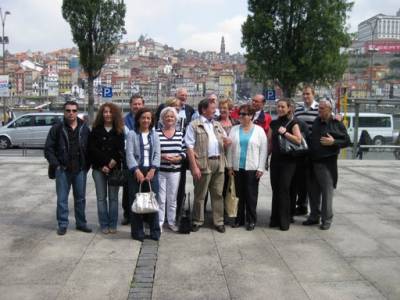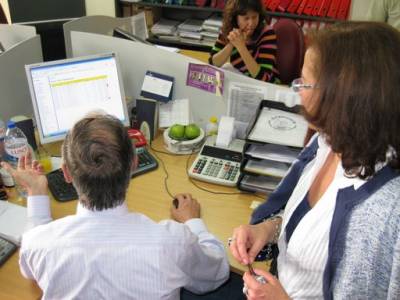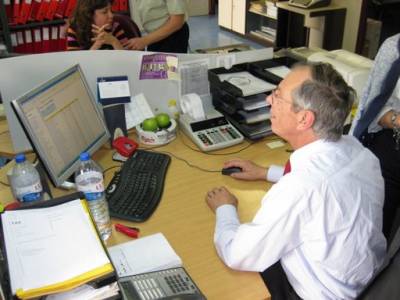OCEAN History 1996 - 2016
Former OCEAN Chairman Michel Van Hulle reflects on the last two decades
As former chairman of OCEAN from 2006-2011 and for decades member of the board of the “Koninklijke Belgische Beroepsvereniging der Scheepsbevoorraders” (Royal Belgian Ship Suppliers Association), which was one of the founding fathers of OCEAN, I am honoured to reflect on the many issues that made OCEAN more important than ever during the last two decades.
The EU grows bigger – OCEAN grows bigger
The European Union changed massively during this time bringing simplification and complication to European ship suppliers. Finland, Austria and Sweden had just become members of the EU and so new ship supply associations joined OCEAN as well. The further enlargement in 2004 added further OCEAN members, including the Maltese and Cypriot ship suppliers associations.
SAD and simplifications for EU ship suppliers
The introduction of SAD, the replacement of 150 separate documents previously used by the customs administrations and the use of harmonized procedures and codes greatly improved the speed and efficiency of ship stores clearance. A simplified procedure for ship stores was set up, so that we could enter our delivered ship stores into our own company records and report them on a periodic basis rather than in real time.
Simplified CN Nomenclature
In addition, due to the nature of our trade and the volumes of diverse products, the EU allowed for a simplified CN to use in the export declarations for ship stores. These codes continue today and are vital to modern ship supply:
- 99302400: goods from CN chapters 1 to 24
- 99302700: goods from CN chapter 27
- 99309900: goods classified elsewhere.
Article 20 of Regulation (EC) No 113/2010 1
This allowed goods delivered to vessels at harbours and be intended for on-board consumption (by persons & engine). For more details as to why these codes matter so much, why not take a read in the excellent research paper produced by OCEAN? Click here.
NCTS and ship supply
The first challenge for European ship suppliers in the 1996 – 2000 years was of the creation of Europe’s NCTS (New Computerised Transit System), the electronic data interchange system which replaced the traditional paper procedure in the Community as well as in the EFTA countries (Iceland, Norway, Switzerland). Ship suppliers depend on the correct use of transit to move ship stores from their point of entry into the EU to the point of their final destination where, usually, they are delivered onboard the vessel, without paying the charges becoming due.
Security amendment to the Community Customs Code
During my OCEAN presidency, we began to talk, due to the aftermath of the 9-11-2011 attacks, about the need for a security amendment to the Community Customs Code. This kept us very busy, as it followed the principle that traders had to provide information on goods prior to import to or export from the EU. Ship supplies being associated with export meant that the period for prior security information for ship stores had to be discussed and agreed. After much debate with the European Commission, the EU agreed with us that goods designated as ship supplies will not leave the vessels once placed onboard and are not destined for import into another country. Consequently, and following the International Convention on the Simplification and Harmonisation of Customs Procedures (revised Kyoto Convention) which stipulates that when a declaration is required concerning stores taken on board vessels or aircraft upon departure from the customs territory, the information required shall be kept to the minimum necessary for the purpose of customs control. Consequently, the EU waives the requirements for the safety and security data in customs declarations as well as the requirement of a specific deadline. Specific security data does not need to be provided.
Trade facilitation measures for reliable traders (AEO status)
From 2005 to today, the introduction of the AEO status became of crucial importance to OCEAN members as well. OCEAN joined the working group to draft AEO guidelines and focused on the need to include provisions for small- and medium-sized ship suppliers, as many ship supply companies fall into this category. Providing leadership and guidance to OCEAN members meant that many ship supply companies have become certified as AEO today and we are proud for modern ship supply to be a proud example of how security & safety and simplifications can go hand-in-hand.
EU visits OCEAN companies on Genoa
OCEAN actively participated in the important drafting work of the ill-faded Modernised Customs Code, which later became the Union Customs Code (UCC) as we know it today. We attended endless seminars, workshops and conferences all over Europe. The highlight, without a doubt, for OCEAN was our invitation of the EU Commission and its Member States to Italy, where we hosted a three-day session in Genova from 10 – 13 February 2009. OCEAN hosted the EU’s Commission WORKING GROUP “Subgroup A” EC-MCCIP of Customs authorities and traders. They were able to undertake a tour of the port of Genoa, visit ship supply companies (like Costa Crociere), Italian customs officials, visit the Acquario of Genova by night and have a detailed legislative drafting session on the MCC in the famous S. Giorgio Palace. This allowed the customs-business trusted partnership to be reinforced and for the specifics of modern ship supply to be considered.
Ship supplies = Export !
The legislative status of ship suppliers remains a controversial issue which continued during the last 2 decades, reinforced during the drafting of the MCC and the UCC. We, in OCEAN, have always argued that goods delivered tax exempt as aircraft and ship supplies are considered to have left the customs territory of the Community once they have been loaded onboard the aircraft or vessel, regardless of the destination of the aircraft or ship. As a result, a customs declaration for aircraft and ship supplies is required following the normal export formalities {as outlined in Article 786 2 (b) of the old CCIP}. This means that ship supply has always been and should always be considered as export.
The problem of Open Movements
Under the new MCC security amendment and the electronic delivery of messages, there was now a need to provide electronic data exchanges between the various customs offices. The confirmation of exit by the customs office of exit (office responsible for the port from where the aircraft or vessel would leave the customs territory of the Community) has to be made once the loading of the goods onto the vessel had been confirmed. But often, ship suppliers faced (and continue to face) situations where electronic messages which were opened are not closed and this continues to bother ship suppliers until today. Ideally, it should work like this: Based on that exit confirmation, the customs office of export should certify the exit to the person who lodged the export customs declaration. This certification can be used as a proof of exit from the customs territory of the EU for the purposes of VAT and excise exemption.
Union Customs Code
The Union Customs Code entered into force on 1st July 2016. Thanks to the great cooperation of the EU Commission and OCEAN, this legislation was accompanied by a detailed guidance document on ship supply. This went a long way in clarifying how ship stores are to be treated. This is essential reading for any customs officials wishing to understand the correct treatment of ship supply in Europe today. It will guide us into the future.
Conclusion
The Ship Supply business is indeed very different today from what it was 40 years ago. We now talk about logistics and just-in-time and specialized warehousing; everything must be as effective as it can be. Ships are modern, there is only a limited crew onboard and with ship turnaround times crucial, harbour times for only a couple of hours. Inquiries and orders come and go via satellites.
This is why OCEAN matters so much, supporting our trade. OCEAN is not all about meetings as there is a lot of background work going on as well. It is a vital component of the European Ship Suppliers industry when it comes to debating and advising on common elements such as in Brussels.




